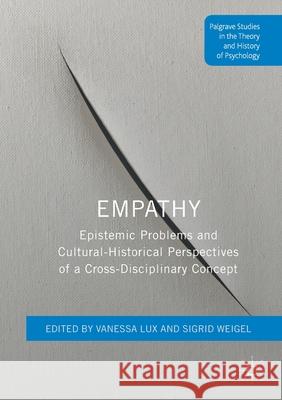Empathy: Epistemic Problems and Cultural-Historical Perspectives of a Cross-Disciplinary Concept » książka
Empathy: Epistemic Problems and Cultural-Historical Perspectives of a Cross-Disciplinary Concept
ISBN-13: 9781349702688 / Angielski / Miękka / 2021 / 325 str.
Empathy: Epistemic Problems and Cultural-Historical Perspectives of a Cross-Disciplinary Concept
ISBN-13: 9781349702688 / Angielski / Miękka / 2021 / 325 str.
(netto: 267,71 VAT: 5%)
Najniższa cena z 30 dni: 269,85
ok. 22 dni roboczych
Dostawa w 2026 r.
Darmowa dostawa!
This book digs into the complex archaeology of empathy illuminating controversies, epistemic problems and unanswered questions encapsulated within its cross-disciplinary history. The authors ask how a neutral innate capacity to directly understand the actions and feelings of others becomes charged with emotion and moral values associated with altruism or caregiving. They explore how the discovery of the mirror neuron system and its interpretation as the neurobiological basis of empathy has stimulated such an enormous body of research and how in a number of these studies, the moral values and social attitudes underlying empathy in human perception and action are conceptualized as universal traits. It is argued that in the humanities the historical, cultural and scientific genealogies of empathy and its forerunners, such as Einfuhlung, have been shown to depend on historical preconditions, cultural procedures, and symbolic systems of production. The multiple semantics of empathy and related concepts are discussed in the context of their cultural and historical foundations, raising questions about these cross-disciplinary constellations. This volume will be of interest to scholars of psychology, art history, cultural research, history of science, literary studies, neuroscience, philosophy and psychoanalysis.











